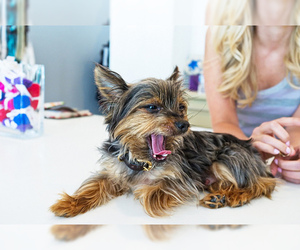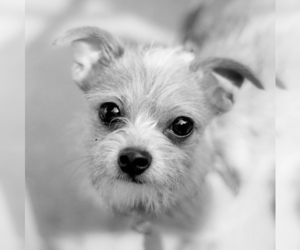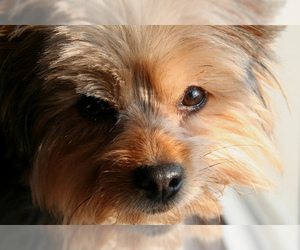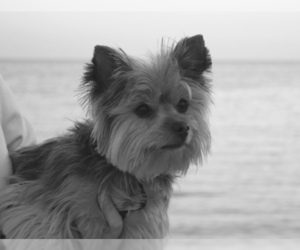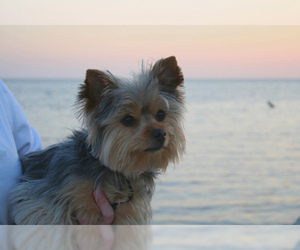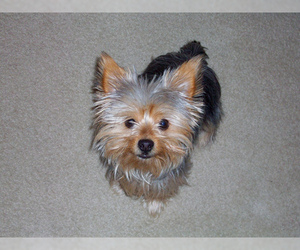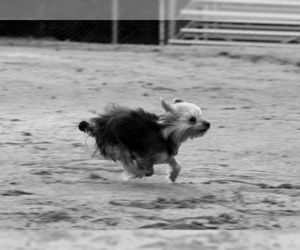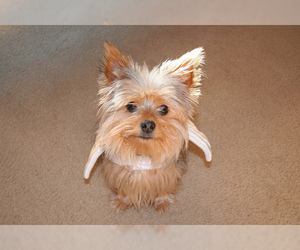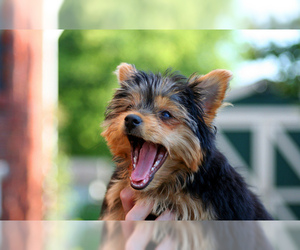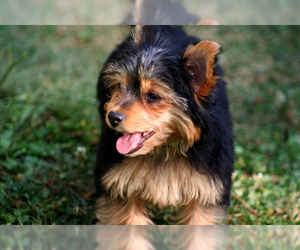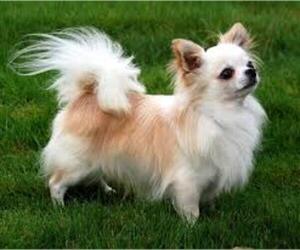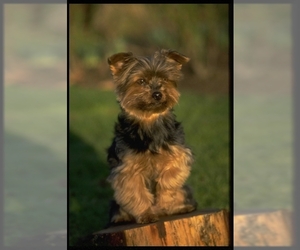All about Chorkie dog breed
A.K.A. :Yorkiechi, Chihuachorkie, Yorkiehuahua
Chorkie is a mix of
Size
Grooming requirements
Exercise requirements
Good with other dogs
Watchdog ability
Energetic
Training requirements
Playful
Affectionate
Good with other pets
Good with children
Good with strangers
Winter
Summer
Healthiness
Protective
Life Span
| Mixed Breeds | Member |
| Breeds A - Z | C |
| Breeds by Group | Terrier Toy |
| Breeds by Trait | Hypoallergenic Low Shedding |
| Overview: | The Chorkie is a delightful designer breed, a charming cross between the spirited Chihuahua and the elegant Yorkshire Terrier. Originating from the desire to combine the best traits of both parent breeds, Chorkies are typically small dogs, weighing between 5 to 10 pounds. Their physical appearance can vary, but they often inherit the long, silky coat of the Yorkie, which can be black, tan, chocolate, or a combination, and often feature the expressive eyes of the Chihuahua. Temperamentally, they are known for being affectionate, lively, and often quite playful, though they can also be fiercely loyal and protective of their families. Their small size makes them exceptionally well-suited for apartment living and they can be wonderful companions for singles, couples, or families with older, respectful children. While generally healthy, potential owners should be aware of common small breed health concerns such as patellar luxation and dental issues. With proper care and early socialization, a Chorkie makes a wonderful, spirited addition to most homes. |
F.A.Q.
All You Need to Know About the "Chorkie" Breed (parent breeds: "Chihuahua" × "Yorkshire Terrier")
The delightful Chorkie, a popular hybrid combining the spirited Chihuahua and the charming Yorkshire Terrier, offers the best of both worlds in a pint-sized package. Originating from designer breed trends, this affectionate companion typically inherits the Yorkie’s luscious coat and the Chihuahua’s bold personality. Chorkies are generally intelligent, playful, and loyal, making them excellent companions for individuals and families with older children. Their small stature makes them perfectly suited for apartment living, though regular, moderate exercise—like daily walks and indoor play—is essential to keep them happy and healthy. Grooming involves frequent brushing to prevent matting, especially for those with longer coats, along with occasional professional grooming. While generally robust, potential health concerns can include patellar luxation, dental issues, and eye problems, common in their parent breeds. Adopting a Chorkie means welcoming a vibrant, loving member into your home.The average Chorkie weight for an adult is typically between 4 to 8 pounds. While there isn't a significant difference, males may occasionally be slightly heavier than females, but both generally fall within this healthy weight for Chorkie range. This Chorkie average size reflects the smaller stature inherited from its Chihuahua and Yorkshire Terrier parents.
Chorkie Height: How Tall is a Chorkie?
The average height of a Chorkie typically ranges from 6 to 9 inches tall at the shoulder. This charming designer breed, a delightful mix of a Chihuahua and a Yorkshire Terrier, usually inherits the smaller stature of both parent breeds.While there isn't a significant height difference between male and female Chorkies, individual genetics from their Chihuahua and Yorkshire Terrier parents can cause some variation. For instance, a Chorkie with more prominent Chihuahua genes might be slightly shorter, while one leaning more towards their Yorkie lineage could be on the taller end of the spectrum. It's always a good idea to consider the size of the parent dogs when estimating the adult Chorkie's size.Ultimately, when considering how tall is a Chorkie, expect a compact and easily portable companion, perfect for apartment living or owners who prefer a smaller lapdog. Their petite average size makes them adaptable and easy to manage.The Chorkie colors are diverse, reflecting their Chihuahua and Yorkshire Terrier heritage. Common and AKC recognized Chorkie colors for parent breeds include black and tan, blue and tan, chocolate and tan, gold, sable, cream, white, fawn, and various combinations. You'll also find parti (two colors, often white with another color) and brindle (streaked pattern) coats.For those seeking rare coat types or exotic Chorkie variations, colors like blue (a dilute black, often appearing grey), lilac (a dilute chocolate, appearing purplish-grey), and merle (patches of dilute color on a solid background) can appear. However, it's important to note that merle is not an AKC recognized color for either parent breed and can be associated with health issues, so research reputable breeders carefully. Chocolate (a rich brown) is also a less common but striking color. Pricing for Chorkies can vary significantly based on these Chorkie colors, with rare or exotic variations often commanding higher prices. Always prioritize health and temperament over specific coat color.
The Chorkie personality is a delightful blend of its parent breeds, the Chihuahua and the Yorkshire Terrier. These small dogs are typically friendly, loyal, and full of character. They often form strong bonds with their families, making them wonderful companion pets.In terms of temperament of Chorkie, they are generally sociable and enjoy being involved in household activities. Their small size makes them highly adaptable to apartment living, provided they receive adequate exercise and mental stimulation. Chorkies are often described as playful and can be quite spirited, despite their miniature stature.Regarding behavior with children, Chorkies can be good family pets, especially with older, respectful children who understand how to interact gently with small dogs. Supervision is always recommended with young children due to their delicate size. When it comes to other pets, Chorkies can generally coexist peacefully, particularly if socialized from a young age. However, their terrier instincts might lead to some spirited interactions with smaller animals, so introductions should be handled carefully. Overall, the Chorkie is an affectionate and spirited companion, well-suited for owners seeking a devoted and engaging small dog.
The Chorkie temperament blends the affectionate loyalty of the Chihuahua with the spirited confidence of the Yorkshire Terrier, creating a charming and devoted companion dog behavior. They are typically friendly and sociable with their human family, forming strong bonds and often displaying a deeply loyal nature. Chorkies are highly adaptable, making them excellent choices for apartment living due to their small size and relatively low exercise needs, though they do enjoy playtime and walks.
Regarding children and other pets, early socialization is key. Chorkies can be good with older, respectful children who understand how to interact gently with a small dog. They may be more reserved or easily overwhelmed by very young, boisterous children. With other pets, especially other small dogs or cats, they can coexist peacefully if introduced properly and raised together. However, their terrier heritage can sometimes manifest as a playful chase instinct with smaller animals.They possess a bright intelligence but can exhibit a tendency toward stubbornness during training, requiring consistent and positive reinforcement. Chorkies are also known for being quite sensitive to their owner's emotions and can become anxious if left alone for extended periods, preferring to be close to their people. Their alertness often makes them good little watchdogs, though they can be prone to barking if not managed. Overall, a Chorkie offers a lively, loving, and engaging personality traits that thrive on companionship and gentle guidance.Chorkie Care: Your Daily Maintenance GuideHow to care for a Chorkie? The Chorkie, a delightful mix of Chihuahua and Yorkshire Terrier, requires attentive yet manageable care. Their small size and specific parentage dictate their needs.Grooming Needs: Chorkie grooming is essential. Expect moderate to high grooming due to their fine, often silky coat inherited from the Yorkie. Daily brushing is recommended to prevent mats and tangles, especially behind the ears and in the "armpit" areas. Professional grooming every 4-8 weeks may be necessary for trims and sanitary cuts. Regular nail trims are crucial to prevent discomfort and splaying of the paws. Bathe as needed, typically every 3-4 weeks, using a mild dog shampoo to avoid skin irritation.Exercise Limitations: Chorkies are a low-energy dog breed. They require minimal exercise, making them ideal for apartment living. Short daily walks (15-30 minutes) and indoor playtime are usually sufficient to meet their activity needs and prevent boredom. Avoid over-exercising, especially in extreme weather, due to their small stature.Dietary Considerations: Chorkie care involves a high-quality small-breed dog food. Portion control is vital for weight management. Their small stomachs mean they thrive on smaller, more frequent meals. Consult your vet for precise feeding guidelines based on age, activity level, and individual metabolism. Avoid human food scraps, which can lead to digestive upset or obesity.Wrinkle and Ear Cleaning: While not typically a brachycephalic breed, some Chorkies may inherit the shorter snout of a Chihuahua, potentially leading to tear staining or skin folds. Regularly check and gently clean any facial folds with a damp cloth to prevent irritation. Their ears, whether erect or floppy, should be checked weekly for redness, odor, or discharge, and cleaned with a vet-approved solution to prevent ear infections.Climate Sensitivity: Chorkies are susceptible to temperature extremes. Their small size and fine coat make them prone to getting cold quickly. Provide sweaters or coats in chilly weather. In hot climates, ensure access to shade and fresh water, and limit outdoor activity during peak heat. They are not built for prolonged exposure to harsh weather.Common Health Concerns & Health Tips for Chorkie:* Skin Issues: Due to their delicate skin, regular grooming and appropriate bathing products are essential to prevent dryness, irritation, or allergies.* Dental Care: Small breeds are prone to dental disease. Daily tooth brushing with dog-specific toothpaste is highly recommended. Regular professional dental cleanings by your vet are often necessary to prevent plaque buildup, gingivitis, and tooth loss.* Weight Management: Chorkies can gain weight easily. Stick to appropriate portion sizes and provide regular, low-impact exercise to prevent obesity, which can exacerbate other health issues.* Patellar Luxation: A common small-breed orthopedic issue where the kneecap slips out of place. Monitor for limping or hopping.* Hypoglycemia: Puppies, especially very small ones, can be prone to low blood sugar. Ensure frequent, small meals.Chorkie care involves consistent, loving attention to their specific needs, ensuring a long, happy, and healthy life for your furry companion.
Chorkie Activity Level & Exercise NeedsWondering, "how active are Chorkie?" Chorkies, a delightful blend of Chihuahua and Yorkshire Terrier, are a relatively low to moderately active breed, perfectly balancing short bursts of playful energy with extended periods of rest. They are not high-endurance dogs but do require consistent daily activity to stay healthy and happy.Typical Energy Levels: Chorkies typically exhibit a moderate energy level. They'll have playful spurts, zooming around the house or yard, followed by long naps curled up on a lap or in a cozy bed. This makes them adaptable to various household dynamics.Daily Exercise Needs: To meet their Chorkie exercise needs, aim for two to three short walks per day, each lasting about 15-20 minutes. These walks provide mental stimulation through new sights and smells, as well as physical activity. Additionally, 15-30 minutes of dedicated playtime daily is crucial. This can involve fetching small toys, engaging in gentle tug-of-war, or interactive puzzle toys that challenge their minds.Playtime Preferences: Chorkies love to play and bond with their owners. They often enjoy indoor games and thrive on interaction. Their small size makes them well-suited for apartment living, where indoor play can fulfill a significant portion of their exercise requirements. They are typically not suited for strenuous, long-distance activities or demanding hikes.Brachycephalic Limitations: Due to the potential for brachycephalic (short-nosed) traits inherited from their Chihuahua parent, Chorkies can be sensitive to heat and overexertion. Always monitor their breathing during exercise, especially in warm weather. Avoid strenuous activity during the hottest parts of the day. A slight snort or snuffle is common, but excessive panting, labored breathing, or blue gums are signs to stop immediately and seek veterinary attention. Their small stature also makes them susceptible to injuries from rough play or falls, so supervise interactions with children and larger pets.Suitability: Chorkies are an excellent fit for low-energy households or individuals who enjoy relaxed companionship. While they appreciate outdoor adventures, they are equally content with cozy indoor living. They are generally not ideal for highly active families seeking a jogging or hiking partner. Their moderate Chorkie activity level makes them wonderfully adaptable companions for a wide range of lifestyles.
Some Chorkies inherit a shorter muzzle from the Chihuahua side, which can make them mildly prone to Brachycephalic Obstructive Airway Syndrome (BOAS). In such cases, applying brachycephalic dog care strategies—such as avoiding excessive heat, using a harness instead of a collar, and monitoring breathing during exercise—can help reduce respiratory stress. Their small size and delicate frame also contribute to heat sensitivity and cold intolerance, so they should be protected from extreme temperatures. Spinal problems such as arthritis or intervertebral disc disease may occur with age or poor conditioning, particularly if they jump frequently from heights.
Understanding how to keep Chorkie healthy involves regular veterinary checkups, early screening for joint and dental issues, consistent grooming to maintain coat and skin hygiene, weight management, and gentle but consistent exercise routines. With attentive care, Chorkies can enjoy a spirited, affectionate life of 12–15 years.
Breed Breakdown: What Experts Say About the Chorkie
I'd rate the "Size" trait of the Chorkie at a 2. This breed is undeniably on the extremely small end of the canine spectrum. Both parent breeds, the Chihuahua and the Yorkshire Terrier, are renowned for their diminutive stature, and the Chorkie inherits these characteristics. Average Chorkies typically weigh between 4 to 8 pounds and stand around 6 to 9 inches tall, making them one of the smallest recognized designer breeds. Their body structure is delicate and compact, reflecting their toy breed heritage. Compared to the vast majority of companion dogs, even other small breeds like the Shih Tzu or Pomeranian, the Chorkie is distinctly smaller. This tiny size makes them exceptionally well-suited for apartment living, as they require very little physical space. They are also ideal travel companions due to their ability to fit comfortably in carriers that meet airline regulations for cabin travel. Households with space constraints will find the Chorkie to be an excellent fit, as they don't demand large yards or extensive indoor areas to thrive.
I would rate the grooming requirements of a Chorkie a 7.This is because, while they are small, they inherit coat characteristics from both parent breeds which lean towards the higher-maintenance side. Chihuahuas can have short or long coats, but Yorkshire Terriers are known for their long, silky, human-like hair that is prone to tangling and matting if not brushed regularly, often daily. This means a Chorkie will almost certainly require frequent brushing to prevent mats, regardless of whether their coat is more Chihuahua-like or Yorkie-like. They are low-shedding, which is a plus, but this non-shedding quality often means that dead hair gets trapped in the coat, necessitating professional grooming every 6-8 weeks for trimming and shaping, similar to a Yorkie. Their small ears can be prone to wax buildup, requiring regular cleaning, and their fast-growing nails will need frequent trimming. While they typically don't have extensive skin folds, their fine hair can become irritated if not kept clean and dry, and some small breeds are prone to allergies, which can manifest as skin issues. Overall, a Chorkie is not a wash-and-go dog; they require consistent attention to their coat and general hygiene to keep them healthy and looking their best, making them a moderately high-maintenance breed compared to many other companion dogs.
I would rate the Exercise Requirements of a Chorkie as a 4.Chorkies, being a mix of Chihuahua and Yorkshire Terrier, generally have moderate to low energy levels. Both parent breeds are small and adaptable, often content with indoor activities and shorter walks. A Chorkie will typically thrive with daily walks of 20-30 minutes, perhaps split into two sessions, and plenty of interactive playtime at home. They enjoy mental stimulation through puzzle toys and short training sessions. While they can have bursts of energy and enjoy a good romp, they aren't built for long-distance running or demanding agility courses. Their small size and delicate build mean they don't require high-impact exercise, and sustained movement isn't a primary need. While not typically brachycephalic, their small stature can make them more susceptible to overheating or overexertion if pushed too hard. They are generally healthy with minimal activity, but structured walks and regular play are important for their physical health and to prevent boredom-related behaviors, ensuring they remain well-adjusted and stimulated without needing an extensive exercise routine.
I would rate the Chorkie's "Watchdog Ability" at a 7 out of 10.Chorkies, inheriting traits from both Chihuahuas and Yorkshire Terriers, tend to be highly alert and responsive to their surroundings. Their small size doesn't diminish their territorial instincts; rather, it often translates into a keen awareness of anything out of the ordinary. They are typically quick to bark at unfamiliar sounds, people approaching the door, or even perceived threats from outside the window. This frequent and often insistent barking serves as an excellent early warning system, effectively notifying household members of potential intruders. While they are unlikely to physically deter a serious threat due to their size, their persistent vocalizations are very effective at drawing attention and signaling that the home is occupied and being monitored. They are more than just passive companions; they are capable of providing meaningful and consistent early warnings in a home environment.
I'd rate the "Good with Other Dogs" trait of the Chorkie at a 5 out of 10.Chorkies, being a mix of Chihuahua and Yorkshire Terrier, inherit a blend of traits that can lead to variability in their sociability with other dogs. Both parent breeds are known for their strong personalities and can lean towards being "one-person" dogs or wary of strangers, including other canines, if not properly socialized. A Chorkie's compatibility with other dogs often hinges significantly on early and consistent socialization. Without it, they can exhibit shyness, fear, or even develop dominant or aggressive behaviors towards unfamiliar dogs, especially if they feel threatened or are trying to protect their human.They don't typically thrive in canine company without careful introductions and training. While some individuals can be quite playful and enjoy the company of other dogs, particularly those of similar size and energy levels, others may require a more structured environment and slow, positive introductions to new canine companions. They might struggle with very large, boisterous dogs due to their small size and potential for feeling overwhelmed. Multi-dog households can work, but careful management of resources and attention, along with a solid understanding of each dog's personality, is crucial to prevent jealousy or territorial issues. They are not inherently the type of dog that will automatically get along with every dog they meet, and owners should be prepared to invest in ongoing socialization and training to ensure peaceful coexistence.
I would rate the Energetic trait of the Chorkie as a 6.The Chorkie, a mix of Chihuahua and Yorkshire Terrier, typically inherits a moderate to active energy level. They are generally playful and enjoy engaging with their owners, often having bursts of activity followed by periods of rest. They possess a good amount of pep for their small size, enjoying short walks, indoor games, and chasing toys. While they aren't marathon runners, they do require consistent daily exercise to prevent boredom and maintain good health. Their endurance is fair for a small companion dog; they can sustain play for a reasonable amount of time but will tire more quickly than larger, more athletic breeds. The brachycephalic tendency, inherited from some Chihuahua lines, can subtly affect stamina. While not all Chihuahuas are significantly brachycephalic, those with shorter muzzles might experience reduced exercise tolerance, especially in warmer weather, making them more prone to overheating and breathing difficulties during strenuous activity. This necessitates owners to be mindful of overexertion and to ensure adequate rest. Overall, the Chorkie is more active than a truly laid-back lapdog but less demanding than a high-energy terrier or working breed.
I would rate the "Training Requirements" of the Chorkie at a 5.Chorkies are intelligent little dogs, inheriting a good deal of their smarts from both parent breeds. This means they are capable of learning commands and house rules with relative ease. However, they can also possess a streak of stubbornness, particularly from the Chihuahua side, and occasionally a feisty independence from the Yorkie. Their attention span can be somewhat short, especially when young or if distractions are present, so training sessions need to be kept brief, engaging, and fun. They respond very well to positive reinforcement, such as treats, praise, and toys, and harsh methods will likely lead to fear or further stubbornness. Consistency is absolutely key; if you're not consistent with rules and commands, a Chorkie will quickly learn what they can get away with. While not the most demanding breed to train, their occasional stubbornness and need for consistent, positive methods mean they might be a little challenging for a complete beginner without a clear plan, but they are generally manageable for owners willing to put in consistent effort and structured routines. They are more beginner-friendly than a truly difficult breed, but not as effortless as some other companion dogs.
I would rate the Chorkie's "Playful" trait a solid 8 out of 10.Chorkies are generally quite spirited and engaging, inheriting a lively disposition from both parent breeds. They typically exhibit a good level of activity for a small dog, enjoying games of fetch, chasing toys, and interactive play with their owners. Their love for games and interaction is quite high, and they often seek attention through playful antics and by bringing toys for you to throw. You'll find they respond to toys and playtime with enthusiasm, often displaying a happy "dance" or a wagging tail. While not hyperactive, their overall enthusiasm in daily life is noticeable, and they thrive on being included in family activities. They are more naturally spirited than laid-back compared to many other companion dogs, often maintaining a puppy-like zest for life well into adulthood.
Rating: 9The Chorkie, a delightful mix of Chihuahua and Yorkshire Terrier, rates exceptionally high on the "Affectionate" scale, earning a 9. Both parent breeds are renowned for their devotion, and the Chorkie typically inherits this strong desire for human companionship. They thrive on affection and are far from independent when it comes to their family, often becoming extremely attached to their owners. Chorkies are known for their love of physical closeness, frequently seeking out laps for sitting, snuggling under blankets, and enjoying extended cuddling sessions. Their loyalty is unwavering, and they are remarkably sensitive to owner emotions, often offering comfort during times of distress. It's common for a Chorkie to shadow their favorite family members from room to room, eager to be involved in whatever is happening. They truly blossom when given ample attention and affection, making them a wonderfully loving and people-oriented companion.
I'd rate the "Good with Other Pets" trait of the Chorkie at a 6 out of 10. While Chorkies can certainly learn to coexist peacefully with other pets, they aren't inherently the most universally pet-friendly breed without significant effort. Their Chihuahua heritage often contributes to a potentially feisty, "small dog syndrome" attitude, which can manifest as bossiness or fear-based aggression towards larger dogs. Both parent breeds have a moderate prey drive, so while they might not actively hunt a cat, a chasing instinct can be present, and they might view smaller pocket pets as prey. Resource guarding can also be a concern, especially if not addressed through early training and consistent management. Due to their small size, they are also vulnerable to accidental injury from larger, boisterous pets. Therefore, successful integration into a multi-pet household heavily relies on extensive early socialization from puppyhood, consistent positive reinforcement training, and careful supervision, especially during initial introductions and when resources like food or toys are present. They are adaptable, but their inherent tendencies mean that peaceful coexistence is more often a product of dedicated owner effort rather than a naturally sociable disposition.
The Chorkie, a mix of Chihuahua and Yorkshire Terrier, rates a 4 out of 10 for "Good with Children."This rating reflects that Chorkies are generally not the most suitable choice for families with children, especially younger ones. Their small size makes them quite delicate and prone to injury if handled roughly, which can easily happen with enthusiastic kids. Both parent breeds are known for their sometimes "sassy" or "feisty" temperaments, which can be inherited by the Chorkie. They often have low tolerance for noise, sudden movements, and unwanted handling, potentially leading to nipping or snapping out of fear or irritation. While some individual Chorkies can be affectionate with their own family, they are not typically known for the inherent patience and gentle playfulness that makes a breed exceptionally child-friendly. They often require extensive early socialization, consistent training, and strict supervision to thrive in a family setting with children, and even then, a calm and respectful interaction is crucial. They are best suited for homes with older, more considerate children who understand how to interact gently with a small dog, or ideally, an adult-only household.
Rating the "Good with Strangers" trait of the Chorkie: 6/10The Chorkie, a mix of the Chihuahua and Yorkshire Terrier, tends to fall in the middle ground when it comes to interacting with strangers. Both parent breeds can be wary of unfamiliar people, with Chihuahuas often being famously "one-person" dogs and Yorkshire Terriers possessing a feisty, protective streak despite their small size. Consequently, a Chorkie is unlikely to be an immediate, effusive greeter of every new face. They can be reserved or even bark at strangers initially, driven by a combination of caution and a desire to alert their owner. However, they are also intelligent and can be quite affectionate once they perceive someone as safe. Early and consistent socialization is absolutely crucial for a Chorkie to develop comfort and confidence around new people and in public settings. Without it, they are more prone to shyness, nervousness, or excessive barking. With good socialization and positive experiences, they can become pleasantly tolerant and even friendly, but they are rarely the type to indiscriminately welcome everyone with open paws; a certain degree of initial discernment is typical.
I would rate the Winter tolerance of a Chorkie as a 2.Chorkies inherit traits from both Chihuahuas and Yorkshire Terriers, neither of which are known for their cold weather resilience. They are small dogs with low body fat and a fine, single-layered coat (even if slightly longer than a short-haired Chihuahua, it lacks the insulating undercoat of cold-hardy breeds). Their diminutive size means they lose body heat very quickly. While not typically brachycephalic, their small stature and lack of insulating features make them highly susceptible to hypothermia in cold temperatures. They are not built for prolonged outdoor activity in cold climates and would shiver excessively, becoming uncomfortable and at risk very quickly. Compared to other companion dogs, Chorkies definitely require special care during winter months, including warm sweaters or coats for even short outings, and ideally, avoiding extended time outdoors when temperatures drop below freezing. They are best suited for indoor living during cold seasons.
Rating: 3Explanation: The Chorkie, a mix of Chihuahua and Yorkshire Terrier, has a low tolerance for summer heat. Both parent breeds are small and prone to overheating. While generally not severely brachycephalic, some individuals may inherit flatter muzzles, further compromising their ability to cool down efficiently through panting. Their small size means they have a limited surface area for heat dissipation, making them more susceptible to heatstroke. Even short periods of exposure to warm temperatures can be dangerous. Outdoor activity should be significantly curtailed during hot weather, ideally limited to early mornings or late evenings when it's cooler. They absolutely require climate control, such as air conditioning, during summer months and should never be left unsupervised in a warm environment, including cars. Compared to many other companion dogs, Chorkies require significantly more special care and vigilance to prevent heat-related illness during summer.
I would rate the Chorkie's "Healthiness" trait a 6 out of 10.Chorkies, being a hybrid of the Chihuahua and Yorkshire Terrier, often benefit from a concept known as "hybrid vigor," which can sometimes result in fewer health issues than their purebred parents, or at least a less concentrated predisposition to specific purebred ailments. Both parent breeds are relatively long-lived, contributing to a decent life expectancy for the Chorkie, typically around 12-15 years.However, they are not without their vulnerabilities. Chorkies can inherit health problems common to both parent breeds. This includes dental issues, which are prevalent in small breeds due to overcrowding and plaque buildup, necessitating diligent oral hygiene. Patellar luxation (slipping kneecaps) is another concern, as is hypoglycemia, especially in very small puppies. Tracheal collapse, a respiratory issue, can also occur, particularly if the Chihuahua parent had a tendency towards it. Eye problems, such as cataracts or progressive retinal atrophy, are also possibilities.While not generally considered high-maintenance in terms of health compared to some large or brachycephalic breeds, Chorkies do require consistent preventive care, including regular veterinary check-ups, appropriate vaccinations, and a keen eye from their owners for any early signs of health concerns. Responsible breeding practices, where parent dogs are screened for genetic conditions, play a crucial role in mitigating these risks. Without such practices, the likelihood of inherited health problems increases. They are generally robust for a small companion dog, but their small size makes them more susceptible to accidental injuries and temperature extremes.
I would rate the "Protective" trait of the Chorkie a 7 out of 10.Chorkies, inheriting traits from both Chihuahuas and Yorkshire Terriers, tend to be quite alert and vocal. They possess strong territorial instincts for their size, quickly recognizing their home and family as their own to defend. Their loyalty to their owners is generally unwavering, leading them to be wary and often quite vocal around strangers. They are excellent watchdogs, reliably barking to alert their owners to anything unusual, from a visitor at the door to a squirrel in the yard. However, due to their small stature, they are primarily a companion dog and while they offer a significant "alert" system and are fiercely protective in spirit, they are not capable of offering meaningful physical protection in the way a larger guard dog might. Their protective nature manifests more in their vocalizations and attempts to place themselves between their owner and perceived threats, rather than in their ability to physically deter an intruder.
I'd rate the "Life Span" trait of the Chorkie at an 8. This breed is generally considered long-lived. Both parent breeds, the Chihuahua and the Yorkshire Terrier, are known for their impressive longevity, often living well into their teens. Chorkies typically inherit this excellent lifespan, with an average life expectancy ranging from 12 to 16 years, and sometimes even longer with proper care. While they can be prone to some small breed health issues like dental problems, patellar luxation, or tracheal collapse, these are often manageable and don't significantly shorten their overall lifespan when responsible breeding practices are followed and owners provide good nutrition, exercise, and regular veterinary check-ups. Compared to many other companion dogs, the Chorkie exhibits above-average to exceptional longevity.
Chorkie Puppies for saleSee all puppies for sale
Chorkie Dogs for adoptionSee all dogs for adoption
Chorkie BreedersSee all breeders
Similar Dog Breeds for Chorkie
Breed Mixes of Chorkie
Quick Breed Selector 0 - not important, 1 - smallest, 10 - largest
Variants & Mistakes :Chorki, Chorkey, Chorkee, Chorkye, Chorkiey, Chokie, Chorkies, Chorkiess, Chorkei, Chorkiew, Chorkier, Chorkeer, Chorke, Chorie, Corkie, Chorky

